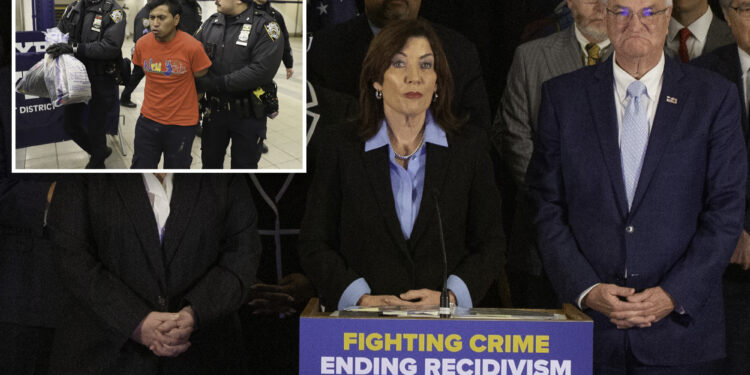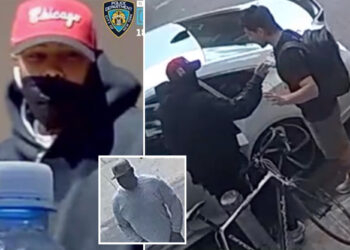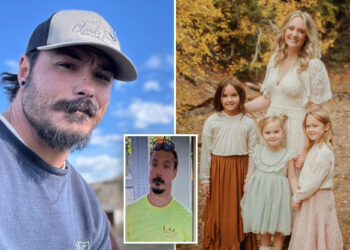
Gov. Hochul is rallying behind Big Apple district attorneys’ push to change the state’s evidence laws — by ending a progressive measure that has led to shocking number of accused criminals getting off on technicalities.
All five of New York City’s top prosecutors, from lefty Manhattan DA Alvin Bragg to conservative Staten Island DA Michael McMahon, flanked Hochul on Friday as she touted the proposed reforms — and cast them as necessary to prevent recidivism.
“We’re continuing to see a real urgent problem of a revolving door of criminals who are arrested and then let out on technicalities, free to commit crimes again,” she said. “Fixing these loopholes will be a step in the right direction to stopping the revolving door of people who are arrested, as I said, and released on a technicality.”
Criminal-case dismissals in New York City stood at 41% before the discovery reforms and shot up to 62% in 2023, Office of Court Administration data show.
A major tweak to discovery laws endorsed by the DAs — and included in Hochul’s whopping $252 billion budget plan — would be to set a time limit for when defense attorneys can request that a case be tossed based on an alleged evidence violation.
This would make it less likely that cases get tossed on technicalities, such as if prosecutors don’t meet deadlines for turning over evidence, the governor’s office said.
The governor also wants to narrow the scope of materials that prosecutors are required to turn over to the defense.
Currently, prosecutors have to submit “all items and information that relate to the subject matter of the case” — an ask that DAs across the state have argued is burdensome as it could include reports, documents and other materials that are irrelevant.
Under Hochul’s proposed bill, prosecutors would only have to turn over evidence related to the specific charge in the case at hand.
Discovery practices were tweaked as part of the state’s 2019 criminal-justice reforms, alongside the highly contentious bail laws, but prosecutors have argued that the changes have led to more criminal cases getting tossed.
The changes to evidence laws proposed by Hochul — and backed by all five city DAs — as part of a new bill, are as follows:
- Reduce the scope of what evidence prosecutors have to gather and hand over to the defense.
- Requires defendants to pose their challenge to a discovery violation within 35 days of prosecutors handing such evidence over.
- Clarifies that a defendant has to show that they were harmed (prejudiced) by evidence not being turned over in order for a case to be dismissed.
- Allows a judge to issue other sanctions for a discovery violation short of dismissing a case entirely.
Reasons behind dismissals vary, but often come down to paperwork issues under the discovery law that have nothing to do with the merits of a case — such as a subway slashing that Hochul highlighted in which the accused madman walked free on a minor technicality.
The governor didn’t provide details, but a law-enforcement source told The Post it stemmed from a December 2022 run-in on a Brooklyn subway platform.
A stranger slashed a straphanger without provocation, leading to a first-degree assault charge, the source said. Prosecutors obtained all the medical records from the victim, but just before trial the man told them about a previously undisclosed follow-up appointment.
Prosecutors immediately told the defense team, and there were no extra records from the appointment, according to the source.
But a judge dismissed the case, ruling that the prosecutors did not exercise due diligence required under the law because the medical records had some indication that there would have been a follow-up appointment, the source said.
It’s not just violent crimes in which accused criminals are sprung loose. Dismissals are especially prevalent in misdemeanor cases such as drunken driving, domestic violence, lower-level sexual abuse and retail theft under the discovery law, said Darren Albanese, executive assistant district attorney for Staten Island.
“Simply, those cases are getting dismissed more than ever, and they’re getting dismissed on technicalities,” he said.
The majority of those case dismissals come down to a “failure to comply” with the discovery law, Albanese said.
Discovery rules call for all evidence to be disclosed within 35 days in most cases, and even shorter in many others. Prosecutors can be found to have run afoul of that ticking clock retroactively if they find and turn over evidence afterward.
The rules perversely incentivize defense lawyers to game the system by claiming to have not received the information weeks or months into a case, often leading to dismissals if a judge agrees with them, the governor’s office said.
The new plan would set a new 35-day limit for when defense attorneys can request a case be dismissed based on alleged discovery errors. The clock would start when prosecutors submit a “certificate of compliance” that they’ve turned over the required discovery evidence.
The undisclosed evidence can be trivial. Albanese highlighted a DWI case in which an allegedly drunken motorcyclist — who had a long criminal record, including another boozy-driving arrest — had the charges dismissed because prosecutors failed to turn over all documents on time from a disciplinary case involving one of the responding NYPD officers.
The cop had been dinged for inadvertently driving over a garbage can, spilling garbage on the street, he said.
“Because of an unrelated disciplinary matter where someone ran over some garbage, the case was dismissed,” he said.
The burdens of Albany’s discovery law even found a vocal critic in Bragg, whose liberal policies have been criticized as soft on crime.
“This data makes clear that discovery is burying our prosecutors in paperwork that is often unrelated to the underlying substance of the case,” Bragg previously told The Post.
Other district attorneys outside the five boroughs — where dismissal rates are not nearly as high — generally agree that some action on discovery is a move in the right direction. District Attorneys Association of the State of New York, headed by McMahon, voted Thursday to back Hochul’s proposal.
McMahon said the bipartisan lineup of prosecutors behind Hochul showed the support for a proposal to “restore balance” to the criminal justice system.
The proposed tweaks were met with outrage from The Legal Aid Society, which argued Friday that Hochul and the DAs cherry-picked data to push a false narrative that the discovery reforms have driven up recidivism and crime.
Liberal lawmakers fought tooth and nail against Hochul’s proposals to try to tweak the 2019 bail laws during 2023 budget talks.
Additional reporting by Peter Senzamici, Ben Kochman and Aneeta Bhole



























